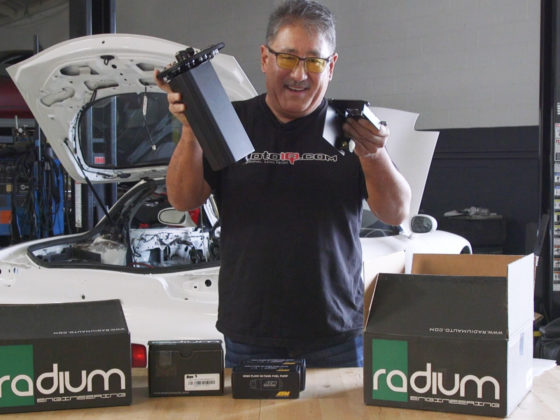
If you own a Focus ST, Garrett Advancing Motion has come out with a new outstanding bolt on performance intercooler upgrade for your car. We obtained a sample of the intercooler for testing at the palatial MotoIQ megashop to perform dyno power and thermal testing to see how effective this unit is.
We like intercooler upgrades, they are a modification that actually gives you something for nothing. Usually, a more effective intercooler can give you more power by improving intake air density as well as less thermal stress on the engine via cooler intake air temps. Cooler temps, in turn, mean less combustion temperature and thus the engine will be farther from the edge of detonation under boost. Water and oil temps can drop. A good intercooler will also have less pressure drop across the core which means that the turbo’s compressor doesn’t need to work as hard to produce the target boost pressure. This means the turbine does not need to recover as much power from the exhaust stream to power the compressor. Less power recovery needed means less backpressure. Less backpressure means less propensity for detonation causing heat retained in the engine as well as better volumetric efficiency. With a cooler intake air temp and less backpressure, the engine’s tolerance for detonation increases which can be exploited through tuning by running more boost pressure and or ignition timing and perhaps a leaner air-fuel ratio to produce even more power.
So for a simple part, an improved intercooler has a cascade effect for making more power while reducing stress on the engine, something we can all appreciate.

The Garrett intercooler uses a bar and plate type core. Bar and plate intercoolers have a lot of thermal mass and can quickly soak up a lot of heat. The core also has internal turbulators which help heat transfer to the outside of the plates.

To aid flow and get the best radius possible from the charge pipes to the core, Garrett used cast end tanks which can have a much more complex geometry than parts fabricated from sheet. All of the welding is strong tig.

Fords tend to have condensation build up in their intercoolers, even on the OEM side which is a known problem. Thus the Garrett intercooler has a built-in drain plug so any accumulated condensation (a known Ford problem) can easily be removed without removing the intercooler from the car.

The Garrett intercooler has the correct bracketry for an easy bolt in. It will fit just like the stock intercooler!




35 comments
how come nobody makes tube and fin intercoolers anymore?
Turbonetics sells them. Spearco, Greddy, etc. Not sure by what you mean by “nobody”.
Turbonetics is bar and plate, Spearco is Turbonetics, Greddy is tube and fin.
I forgot about japanese manufacturers… Looks like Greddy and HKS make tube and fin intercoolers, I should be able to make it with some cutting and welding on the endtanks
They have universal intercoolers as well so you can probably find one close.
How would I go about figuring out how big of an intercooler I actually need?
I usually run the biggest thing that will fit considering airflow to other heat exchangers, aero and charger pipe length.
I guess what I’m asking is how do I figure out the minimum size? The car in question is an NC3 Miata with a 2.5 engine and an EFR6728. Front opening is tiny, so I need the intercooler to be as small as possible to allow air to actually get to the radiator and oil cooler. Is there any math I can do or am I kinda stuck with the guess and verify method?
I mean you can get the BTU numbers from the manufacturer, do the math on how much the turbo will heat the air, figure in the pressure drop at the flow rating and then end up doing it my way anyway! Since you are trying to fit something onto something that was not designed to accept it, this is the way of the world.
Haha… ok, your way it is…
For cars always in motion like road racers, I prefer a good tube and fin as well and been having a hard time finding them if Greddy doesn’t make a core.
especially for cars that have to share 1 opening for intercooler and radiator and oil cooler… like Miata’s…
Yeah, the S2000 has the same issue of only a single small front opening. So you have to make it as easy as possible for the air to get out, i.e. vented hood. Also consider mounting your oil cooler in one of the corners. Side note, you’ve seen this miata right?
https://motoiq.com/2019-super-lap-battle-usa-at-circuit-of-the-americas/2/
Yeah, s2k is kinda in the same boat, but there is more space… which give you a bit more options…
The hood is already vented, area behind the radiator will be pretty open once round 1 changes are complete (bought a 95% finished car from a friend). Later on I want to get some ducting made for a clean path to the vented hood. This will be higher priority if round 1 changes don’t improve cooling enough.
The car has a dual pass Mishimoto oil cooler that measures about 10″x11″. I’m not huge fan of Mishimoto products, but I’ll see if I can get that to work before replacing it. Right now its mounted right in front of the radiator, covering prolly more than a 1/3 of the rad surface area. The current plan is to put a fan on it. Derale make an 11.75″ fan that flows 2200 CFM… but thats bigger than the oil cooler… and space is tight, not sure if I’ll be able to get that to fit. So I’ll prolly end up with a Spal 10″ fan the flows 1300 CFM. Being mounted right in front of the rad, that should help moving air through that as well. Although oil is typically hotter than coolant, hopefully that won’t have an adverse effect on coolant temps. As far as moving the oil cooler to the side, there’s really not much space there in an NC… there’s no space there with brake ducting going through there, which I’m thinking I might reroute to dump are into the rad and oil cooler instead. A few other people have had luck moving the oil cooler in front of the intercooler. If I get desperate I might try that.
Round 2 will involve a splitter and cutting a hole at the bottom of the bumper to get fresh air under the intercooler, prolly some ducting as well. It’ll reduce the effectiveness of the splitter, but what good is a splitter if the car gets too hot when you try to go fast enough to use the splitter.
So there’s a bunch of info nobody asked for…
and yes, I’m very familiar with the NC HAMR. Unfortunately, my day job isn’t building race cars and I don’t possess the fab skills to build a tube frame front end to accommodate a giant custom Ron Davis radiator/oil cooler combo unit… yes I’m a little bitter… haha…
I actually don’t know if he runs a bar and plate or tube and fin intercooler… but with the way he fabbed things up, both get plenty of airflow, as evidenced by his performance at COTA.
Bob, have you considered mounting the oil cooler behind the radiator like I did on Project S2000? The air coming off the radiator still has thermal availability to cool the oil. Did you see the Grand Am feature I did? They use a huge oil cooler mounted behind the radiator. Basically the oil cooler is the same size as the radiator. https://motoiq.com/trans-am-racing-with-burtin-racing/4/
Oh yeah, check out Improved Racing for oil cooler options.
I have thought about putting the oil cooler behind the radiator, but that would require a decent bit of custom work with the way stuff is setup on the NC. I may still do it sometime in the future, but not right now. The main issue is the size of the radiator, on the S2000 you still have enough space to keep a good size fan on there. On the NC I’d have to convert it to a push fan. The other idea I’ve come up with is to mount the oil cooler horizontally just under one of the hood vents, and put a fan on it just for good measure… The car does have pretty big hood vents, I can’t post pics in comments, but if you google “NC hood vents” its the ones that show up the most.
I’ve looked at Improved Racing oil coolers, actually using one of their oil filter relocation with a built in thermostat. I haven’t been able to find any reviews about their oil coolers though… are they better than Setrab?
Full disclosure, I’m buddies with the owner of Improved Racing. We did car stuff together back in college. He was an engineer at Lockheed and started Improved Racing on the side making stuff for his LS swapped FD. I helped a little bit on his strut tower bar. After a while, he quit Lockheed to focus on Improved Racing full time. We chatted a bit when he first looked into doing his own oil coolers and talked about his test setup. Mocal/Setreb/Earls, they are all the same old design. I wouldn’t be surprised if they all come from the same factory and are rebadged. Improved Racing took a new approach and I feel their new design has the advantages they claim.
As I’ve learned, just because something has been the industry standard for a long time doesn’t mean there isn’t room for improvement. Take Staubli quick connect fluid couplings which are common in motorsports. I had an application where I needed minimum pressure drop and the Staubli’s didn’t cut it. Not even close. I searched the whole market including some defense contractors and ended up designing my own. I got a patent filed for it too.
So like old school Mocal oil thermostats. They’ve been the go-to in motorsports for a long time. But Improved Racing saw room for improvement and made a better product. My buddy takes a lot of pride in his products and also the satisfaction of his customers, so I have no hesitation recommending them.
yeah I’m a big fan of Improved Racing stuff, I actually have one of their thermostatic oil filter relocation adapter things going on the car.
I may try the Improved Racing oil cooler if the Mishimoto (not purchased by me) cooler thats already on the car still doesn’t cool enough with a fan on it. But I’m kinda hesitant since both of them are dual pass, same tube and fin style core, the Mishimoto is actually a bit bigger. I know not all tube and fin cores are created equally… but I have a hard time wrapping my mind around getting a smaller cooler that looks to be equal in every other way
so… where can I buy these quick disconnect couplers you patented?
Wow… F*ck Mishimoto. The oil cooler is at least the second design they’ve stolen from Improved Racing. Mishimoto stole the LS1 oil cooler adapter from Improved Racing too. My buddy showed me the bill of sale to Mishimoto for the adapter. He didn’t think they’d actually copy the design; he thought they were just using it for a project or something. It was shipped straight to the Mishimoto office.
As for my patent, here it is:
https://patents.google.com/patent/US20180003324A1/en
Faraday Future owns it as I developed it there.
yeah I’ve never been a fan of mishimoto… pretty sure they also stole the basic inline oil themostat design too. only reason the oil cooler is on the car is cause the shop (also assholes) that did the build originally put it on there and sold it to the previous owner as a “speedway oil cooler” and charge him more than double its list price. and then another 1k or so to weld 4 metal bars together to mount it. My own money will never go towards any mishimoto products. They do have good marketing people, sponsoring every drift team that would take them was a good move, it validates them as a legit brand that real race cars run, so people buy their crap. Walking the pits at FD this past weekend, almost every car had mishimoto stuff on it. But hey, at least I supported Improved Racing with the thermostat filter relocation thingy 😀
the valve is pretty cool, I just spent about a half hour nerding out on it and then on regular dry break valves, I like yours more. So given that the patent is owned buy Faraday Future, I’m assuming I can’t buy one?
Not in production unfortunately. And the design isn’t production validated; I just made a few prototypes and tested for flow, but not durability. However…. I was working with a supplier named Battlefield while I was at FF and they have a product that is pretty close 🙂 http://battlefield.biz/hf_series_list.php Scroll down about halfway on this page to see a section view: http://battlefield.biz/advantage.php
These guys make products for the military and is extremely high quality. Their pricing is also not any more than Motorsports Staubli dry breaks. Which is to say, about $500 a set though… But keep an eye out for Jiffy-Tite to see what they come up with in the next year.
500? so how bad is something like this for about 50?
https://www.racetronix.biz/product.asp?ic=qds-0506a&gclid=EAIaIQobChMIrY3hhrjP4wIVEqrsCh28XwByEAYYCSABEgLH_vD_BwE
The grill shutters are pretty much just for fuel economy by way of drag reduction.
Maybe that’s why some people criticize Ford’s Ecoboost engines for having inconsistent performance under continuous hard driving. Certain modern turbo engines from other brands that are tuned similarly to the Ecoboost from the factory also have the same inconsistent behaviour.
why do Fords have issues with condensation building up in the intercooler? More specifically, why only Fords? I mean if this is a thing, wouldn’t it affect all turbo intercooled cars?
Fords seem to do it worse than others. If anyone knew why, they would not do it.
actually now that I think about it, I’ve heard about the turbo 1.5 Honda engines having the same issue…
It may be their tuning strategy, i.e. lots of low-end torque. When you compress air and then cool it, the water condenses out more easily than at ambient air pressure. So with lots of low-end torque, you’re running a lot of boost pressure to compress it a lot. Then you have a big intercooler to chill the air (allowing lots of timing for low-end torque) which can cause water to condense out. Because the engine is at low rpms, there’s not much air mass flow/velocity, so not enough velocity to carry the water out of the IC. Just a hypothesis.
That makes a hell of a lot of sense Khiem!
that does make a lot of sense, but then again, thats the tuning strategy for pretty much every decently modern turbo oem… I mean there might be a couple outliers, but most of them have a mountain of low end torque that starts falling off at like 3-3500 rpm
Volvo included a small drain hole in the bottom tank of their factory intercoolers on the 94-00 850/S70/V70s. I would imagine that condensation was why they added the weep hole because I’ve never heard of anyone having condensation issues on those cars, even with ~20 year old stock intercoolers.
Oh yeah, forgot to mention, my buddy who was an engine calibrator at Ford in the early-mid 2000’s said there are something like 9 ignition timing maps the ECU interpolates between depending on conditions.
My Porsche has scores of them, the Dyno Spectrum guys showed me. I hate late model cars!
Please make one for the 2018+ Honda Accord Garrett if you are listening! I can feel the effects of heat soak with the stock intercooler after a couple WOT pulls especially in this recent weather.